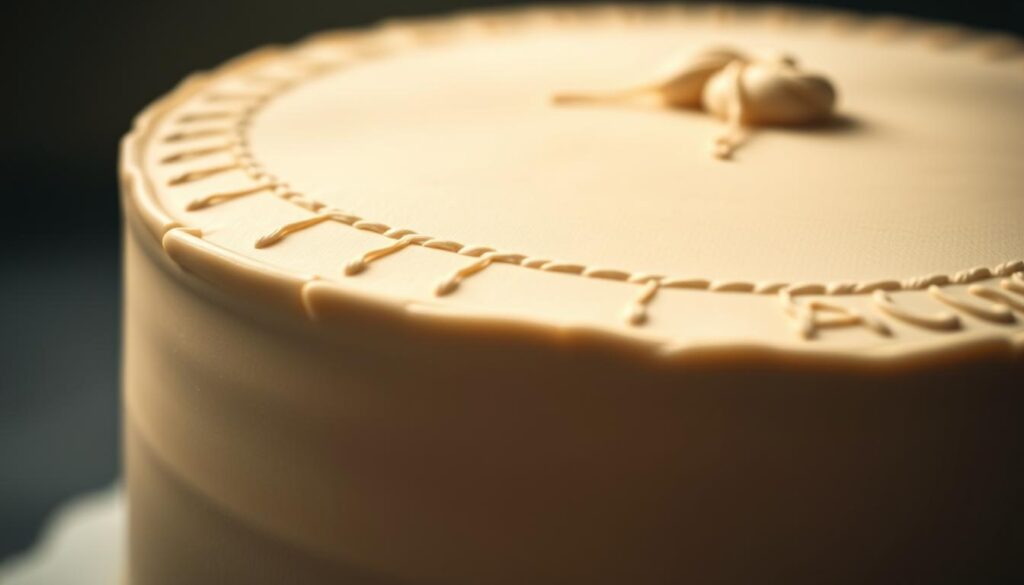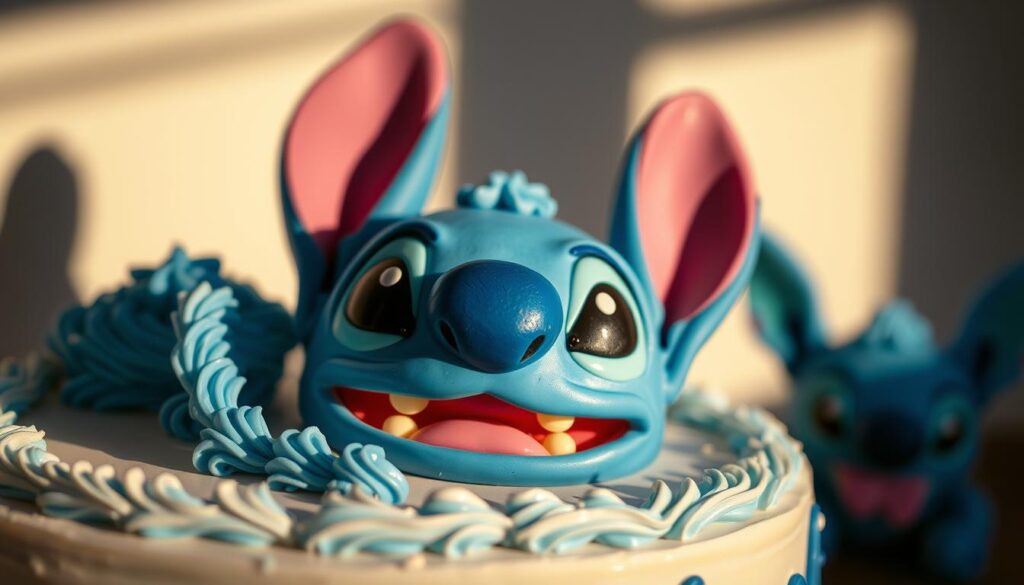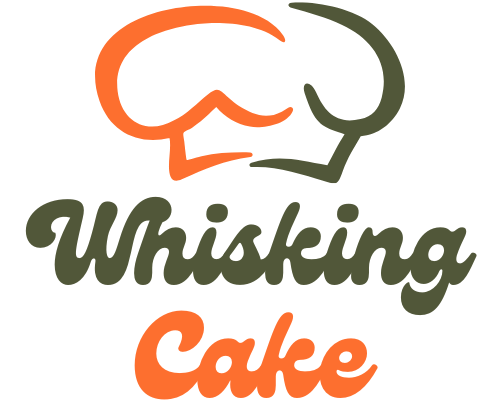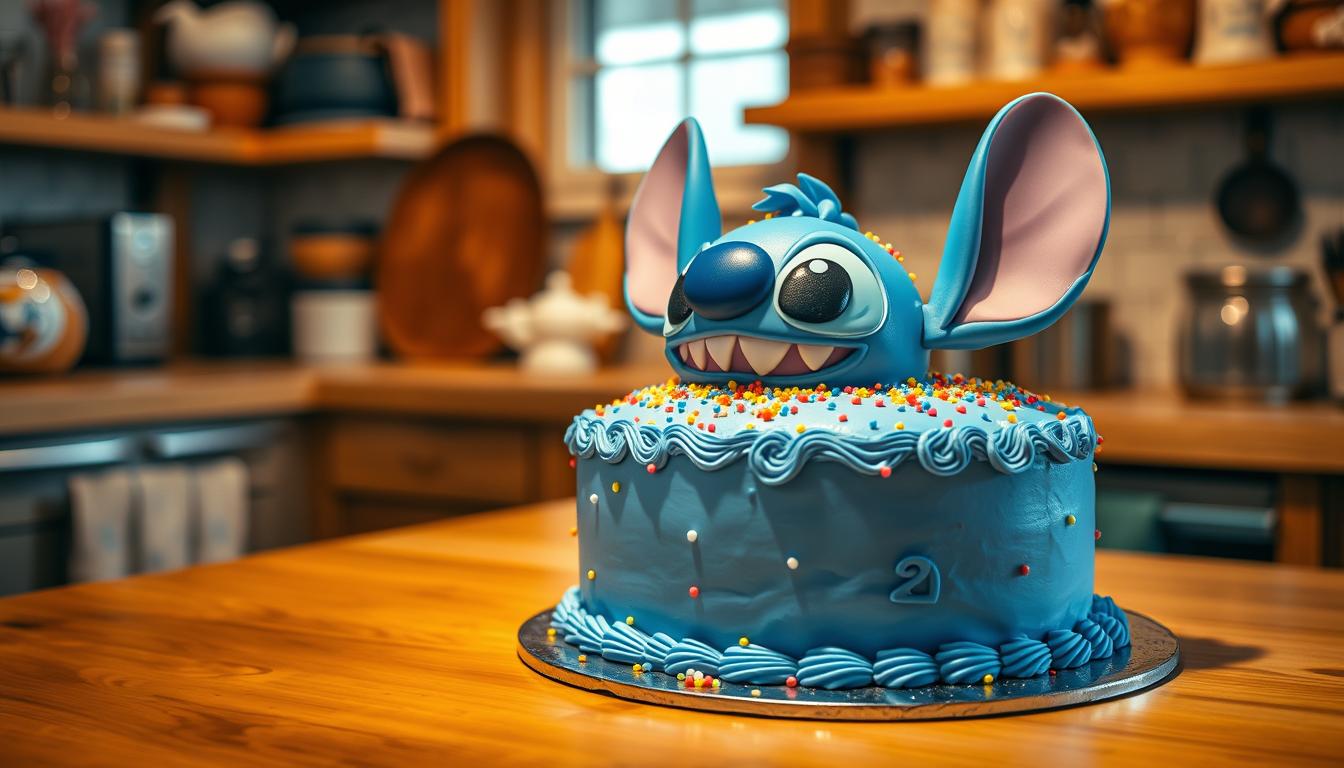Explore the magical world of cake decorating with a Stitch cake. It brings Disney’s beloved character to life. These cakes are a hit at birthday parties and special events, loved by fans of all ages.
Whether you’re new to baking or a pro, making a Stitch cake is a fun way to show off your skills. You can go from simple to detailed designs. These cakes offer endless ways to make them your own.
Table of Contents
Understanding the Basic Requirements for a Stitch Cake
Making a Stitch cake needs careful planning and certain skills. It doesn’t matter if you’re new or have lots of experience. Knowing what you need is key to making a cute Stitch cake.
Essential Tools and Equipment
Get the right tools for working with fondant and buttercream. Your toolkit should have:
- Piping bags and various tip sizes
- Offset spatulas for smooth frosting
- Fondant tools (rolling pin, smoothers, cutters)
- Turntable for easy cake rotation
- Bench scraper for clean edges
Key Ingredients for Success
Choose top-notch ingredients for a great-looking and tasting Stitch cake. Focus on these important items:
| Ingredient Category | Recommended Options |
|---|---|
| Cake Base | Vanilla, chocolate, or blue-tinted sponge cake |
| Frosting | Buttercream (vanilla or blue-colored) |
| Fondant | Blue, white, and black for Stitch character details |
| Food Coloring | Gel-based colors for vibrant, concentrated shades |
Skill Level Assessment
Your success depends on matching the cake’s complexity to your skill level. Here’s a quick guide:
- Beginner (1-2/5 difficulty): Simple buttercream design, basic piping
- Low Intermediate (2-3/5 difficulty): Basic fondant stitching, simple character features
- High Intermediate (3-4/5 difficulty): Advanced buttercream needlework, detailed textures
- Advanced (4-5/5 difficulty): Intricate fondant sculpting, complex layering
Remember, practice makes perfect. Start with simpler designs and gradually challenge yourself with more complex techniques.
Choosing Your Stitch Cake Design Style
Exploring cake couture, you’ll find a wide range of Stitch cake designs. These designs can make your baking project stand out. Your choice depends on your skill level, how much time you have, and the occasion.
- 2D Sheet Cake Designs
- Great for beginners
- Simple Stitch image printed or hand-decorated
- Quick to make
- 3D Character Sculptures
- Needs advanced edible embroidery
- Intricate Stitch figure representations
- Requires a lot of cake decorating skills
Think about your skill level when picking a design. Beginners might prefer flat designs. Experienced bakers can try three-dimensional sculptural cakes that make Stitch come alive.
Each design style has its own challenges and creative chances. Your cake can be a cute, simple Stitch image or a detailed character sculpture. It can be the highlight of any celebration.
Preparing the Perfect Cake Base and Filling
Making a stunning Stitch cake starts with a strong base. Your cake base is key for successful pastry seaming. It’s what makes those sewn confections a hit with kids and parents. Since 78% of parents love character-themed cakes, getting the base right is crucial.
When picking your cake, think about these important points for a great result:
- Structural integrity for decorating
- Moisture retention
- Flavor compatibility
- Temperature stability
Cake Flavor Options
Your Stitch cake needs a flavor that matches its fun design. Here are some favorites:
- Vanilla – classic and versatile
- Blueberry – matches Stitch’s blue theme
- Chocolate – rich and indulgent
- Funfetti – for extra kid appeal
Filling Combinations
Choosing the right filling boosts both taste and stability. Bakers suggest fillings that add moisture without weakening the cake. Here are some top picks:
- Cream cheese buttercream
- Fruit preserves
- Chocolate ganache
- Whipped vanilla custard
Structural Considerations
Your cake’s design is key for a stunning Stitch look. Use a three-layer approach with dowel supports for stability. Baking at 350°F and layering carefully will give you a pro-like finish.
Pro tip: Chill your cake layers before assembling to make pastry seaming easier and more precise.
Mastering Fondant Techniques for Character Features

Making a stunning Stitch cake needs precise fondant stitching skills. These skills turn a simple dessert into a work of art. With fondant character cakes growing 22% in 2022, learning these techniques is key for bakers and cake lovers.
Professional cake decorators say focusing on key character features is crucial. Your Stitch cake will come to life with careful shaping and strategic detailing.
- Select high-quality blue fondant for authentic color matching
- Use soft modeling tools for precise feature sculpting
- Create texture that mimics Stitch’s unique fur-like appearance
- Practice smooth blending techniques
Getting realistic character features takes patience and practice. Over 50% of professional bakers say fondant gives better looks.
| Feature | Technique | Difficulty Level |
|---|---|---|
| Eyes | Rounded fondant spheres | 2/5 |
| Ears | Triangular shaping | 3/5 |
| Facial Expression | Delicate surface detailing | 4/5 |
Pro tip: Keep your room temperature between 70-72°F for the best fondant handling and sculpting.
Remember, practice makes perfect in cake couture. Your Stitch cake can be a showstopper that pleases both kids and adults. 70% of parents say themed cakes make celebrations better.
Creating the Perfect Buttercream Canvas
Mastering buttercream needlework turns your Stitch cake into a masterpiece. Your buttercream canvas is the base for a stunning baked thread art piece. It will surely amaze everyone.
Professional bakers see buttercream as more than frosting. It’s a canvas for creativity. The right techniques can make your cake go from simple to stunning.
Color Mixing Guidelines
Getting the perfect color is all about precision and creativity. For your Stitch-inspired cake, here are some color mixing tips:
- Start with white buttercream as your base
- Use gel food coloring for vibrant, concentrated colors
- Mix colors gradually to control shade intensity
- Test color swatches on a small portion before full application
Texture Techniques
Buttercream texture can change your cake’s look. Try these techniques:
- Smooth finish using a bench scraper
- Rustic texture with an offset spatula
- Fur-like effect using special piping tips
- Textured patterns with specialized tools
Temperature Control Tips
Temperature is key for buttercream texture. Follow these tips to keep it just right:
| Temperature Range | Buttercream Condition | Recommended Action |
|---|---|---|
| Below 60°F | Too Firm | Let sit at room temperature |
| 70-75°F | Perfect Consistency | Ready for decorating |
| Above 80°F | Too Soft | Refrigerate briefly |
Pro tip: Always keep your buttercream at a consistent room temperature for the best decorating experience.
Essential Stitch Cake Decorating Methods

To make your Stitch cake stand out, you need to learn key decorating skills. Embroidery piping is especially important. It helps create realistic textures and details that make your cake look alive.
There are several ways to make your Stitch cake design pop:
- Edible embroidery techniques for realistic fur texture
- Precision piping for facial features
- Airbrushing for smooth color transitions
- Hand-painting delicate details
Piping is the most flexible method for capturing Stitch’s look. You’ll need to practice with different tips and control the pressure. This will help you get the fur texture right.
| Technique | Difficulty Level | Time Required |
|---|---|---|
| Embroidery Piping | Intermediate | 30-45 minutes |
| Airbrushing | Advanced | 15-20 minutes |
| Hand-Painting | Advanced | 45-60 minutes |
Start by practicing on dummy cakes. Spending time to get better at these techniques will make your Stitch cake look amazing.
Advanced Piping Techniques for Details
To make your cake decorating stand out, learn advanced embroidery piping techniques. These methods turn a simple cake into a stunning work of art. They add amazing detail and depth to your Stitch cake.
For detailed character features, precision is crucial. Your piping skills will show how expressive and realistic your design can be.
Creating Facial Features
To capture Stitch’s personality, focus on facial details. Here are some tips for perfect results:
- Choose fine-tipped piping bags for small eye and mouth details
- Keep your pressure steady for even lines
- Use gel colors for bright, clear facial expressions
- Try different tip sizes for unique textures
Adding Dimensional Elements
To add depth to your cake, use three-dimensional techniques. Layered embroidery piping can create textures and patterns. This makes your Stitch cake stand out.
Texture Enhancement
Texture makes a design come alive. Learn these advanced piping methods to achieve realistic textures. This will bring out Stitch’s furry, lovable look.
- Use star tips for fluffy fur-like textures
- Layer multiple piping techniques for complex surfaces
- Control buttercream temperature for the best piping
Remember, mastering advanced piping techniques takes practice and patience. Each cake is a chance to improve your skills and create something unique.
Incorporating Hawaiian Theme Elements
Creating a Stitch cake that celebrates Lilo’s Hawaiian roots can turn your cake into a stunning work of art. The secret is to capture Hawaii’s spirit through thoughtful design. This brings the island’s beauty to life.
Begin by choosing colors that match Hawaii’s landscapes. Think about adding these design elements:
- Tropical flower decorations like hibiscus and plumeria
- Edible beach-inspired details such as sugar sand or coral textures
- Miniature fondant palm trees or surfboards
- Blue and green color schemes reminiscent of ocean and island scenery
Adding authentic Hawaiian touches can make your cake truly stand out. Use buttercream for textured waves or fondant for island elements. Your goal is to make your cake a storytelling canvas that takes viewers to Hawaii.
Pro tip: Look into traditional Hawaiian patterns and symbols to add cultural depth to your Stitch cake. Small touches like wave patterns or cultural references can make your cake more than just a decoration. It becomes a celebration of art.
Troubleshooting Common Stitch Cake Challenges
Making a Stitch cake can be tricky, even for skilled bakers. You might face issues with fondant stitching and pastry seaming. Knowing these common problems helps you tackle them with confidence.
Fondant troubles can ruin a cake fast. To avoid elephant skin and tears, handle fondant carefully and use the right techniques. Keep your workspace cool and use cornstarch to prevent fondant from sticking. Roll your fondant evenly and handle it gently to avoid damage.
Color bleeding is a big worry, especially with bright blue colors. Use gel food coloring and let each layer dry before adding more decorations. Good pastry seaming techniques can also help keep colors from mixing.
Keeping a multi-tiered cake stable is key. Use dowel rods and cake boards to support layers. This ensures your Stitch cake stays upright and safe. Practice good support and think about how decorations weigh to avoid collapse.

